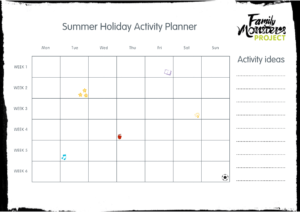Being a parent or carer can sometimes feel like a full time job in its own right – especially during the long hot summer holidays. It’s hardly surprising then that so many of us struggle to come even close to any kind of work-life balance. Read on for some practical tips we’ve gathered as part of our Family Monsters Project that may just ease the pressure.
The challenge of achieving that often elusive work-life balance is particularly true these days for families where both parents work, or for those raising their children as single parents. To help make balancing our family and work lives a little easier, we asked parents across the country for their top ten ‘real life’, practical solutions to combining work and parenthood. We hope you find at least one or two new ideas in our suggestions below – and if you’ve already put any into practice and can recommend them to other parents, please do let us know by joining the conversation on Twitter, Facebook and Instagram using our hashtag #MyFamilyMonsters!
Make more food
 When preparing meals like pasta, it doesn’t really take any more time to chop extra vegetables or weigh out more pasta, so why not make two or even three meals worth at the same time? This way you can freeze the ‘leftovers’ for quick meals at a later date – with virtually no extra effort!
When preparing meals like pasta, it doesn’t really take any more time to chop extra vegetables or weigh out more pasta, so why not make two or even three meals worth at the same time? This way you can freeze the ‘leftovers’ for quick meals at a later date – with virtually no extra effort!
Make food at different times
We all have slightly different working patterns – for instance you may have more time in the morning and less in the evening. In this case, why not follow the suggestion of one of our parents and use a slow cooker to prepare the evening meal in advance. These mechanical marvels allow you to leave your meal cooking safely while you work during the day; in fact meals you often wouldn’t be able to cook in the time available when you get home from work!
Shop smart
Cooking and food preparation is time consuming – and costly (which is why we’ve devoted so much of this list to it)! One parent we spoke with suggested having a weekly meeting with your partner to plan the week’s meals in advance. This way you’re less likely to buy extra food that’s not needed: so less money spent, and often less food wasted! Because you’re both more aware of what you’ll be eating each night, it also means one of you can pick up the slack with the cooking if you get home early, regardless of whose turn it is.
Use a shopping list app
One parent we spoke with says they have an app for their phone which lets them and their partner add things they need to a shared, online shopping list. This is useful when planning meals in advance (as above), but also means you can add items to the list whenever you notice they’re nearly finished. This can be really useful if you’re a busy parents who picks up the shopping on the go, as it means your list is always up to date – and again (at least in theory) you’re less likely to impulse buy as you can speed shop for what you actually need! There are several free apps for both iPhone and Android, so check them out.
“There’s a reason so many of us are stressed at work… it’s because we never really leave!”
Don’t take your work phone to bed
There’s a reason so many of us are stressed at work… it’s because we never really leave! Worrying research clearly shows that more and more of us are waking in the night to check our work emails. Studies may disagree on the precise effect bedtime use of our smartphones has on sleep, but the parents we spoke with at least believe that taking your work phone to bed causes friction with your partner, causes you anxiety and lowers your productivity in the long run (due to fatigue). Obviously different jobs have different requirements when it comes to working out of hours. Whatever your obligations, why not set a deadline each day when you’d like to turn off your phone and stop working – and make sure you’re not wearing your pyjamas when you do! Also try to avoid picking up work emails on holiday – or at least agree a time when you can be contacted, and stick to it. Also make sure you turn on your out of office so everyone knows you can’t be reached.
Get ahead by doing certain things the night before
If you’re wondering what you’re going to do with your evenings, now you’re no longer checking your work phone, we’ve got good news for you! Many of the parents we spoke with agreed that a small amount of planning or preparation the night before can make a real difference in reducing stress levels brought on by our typically hectic morning nursery/school/work routines. Suggestions of things to do the night before included:
- Lay out the children’s clothes and school uniforms
- Make their sandwiches (and yours)
- Do reading practice with children before bed (instead of rushed over breakfast when you’re tired and already multi-tasking)
- Get your work clothes ready
- Make sure you’ve got any glasses you might need to avoid forgetting or having to hunt for them in the morning!
- Prepare any documents or travel cases for work
Arrange a childcare swap
If you’re struggling to arrange work around the holidays and have friends with children of a similar age to your own, try pooling your resources: for instance, see if you can take alternate days off so you can look after each other’s children on the days you’re not working. An added bonus is that the children will no doubt love the novelty of playing together – especially at each other’s houses – making it a lovely day for all involved!
 Set up a family calendar
Set up a family calendar
Modern families are rarely simple – and between work commitments, out of school clubs, activities, play dates and shopping, it’s sometimes hard to keep track of what’s going on. One thing that lots of parents told us really works was setting up a simple family calendar, so everyone could clearly see what was going on. It doesn’t matter whether you prefer a good old fashioned paper calendar stuck on the fridge – or one on your mobile or PC that notifies you when your partner adds something. What’s important is having a definitive list somewhere.
Consider flexible working
If you’ve worked at your organisation for more than 26 weeks, you have a legal right to ask if you can work flexibly. This can be really useful in achieving a good work-life balance, as it allows you to do things like collect your children from nursery or school, as well as attend appointments and events that only take place during working hours. Different types of flexible working are available – including job sharing, working from home, part time working, compressed hours or flexitime. Although your employer has a duty to consider your application, they can reject it for a number of reasons – for instance whether you can continue to get the work done effectively – so it’s worth thinking about how the arrangement might actually benefit your employer too. You can find more information about flexible working on the government website.
Buy back time from work
One practice that’s becoming more and more common – particularly in organisations like the NHS and local councils – is allowing workers to ‘buy’ additional annual leave from their employer. Terms may differ from one organisation to the next, but typically involves paying back your hourly rate to your employer for the number of extra hours (or days) you’d like to take. This can be especially useful for families, where time and not money is their principal pressure. However, be aware that even where organisations allow it, the maximum amount of extra hours you can take is capped (typically around 2 weeks or so). If this is something you’d like to consider, we’d recommend speaking with your HR department.
If you found any of our above ideas helpful in reclaiming quality time with your family this summer holiday, please visit our Family Monsters site for more tips, information and support.










